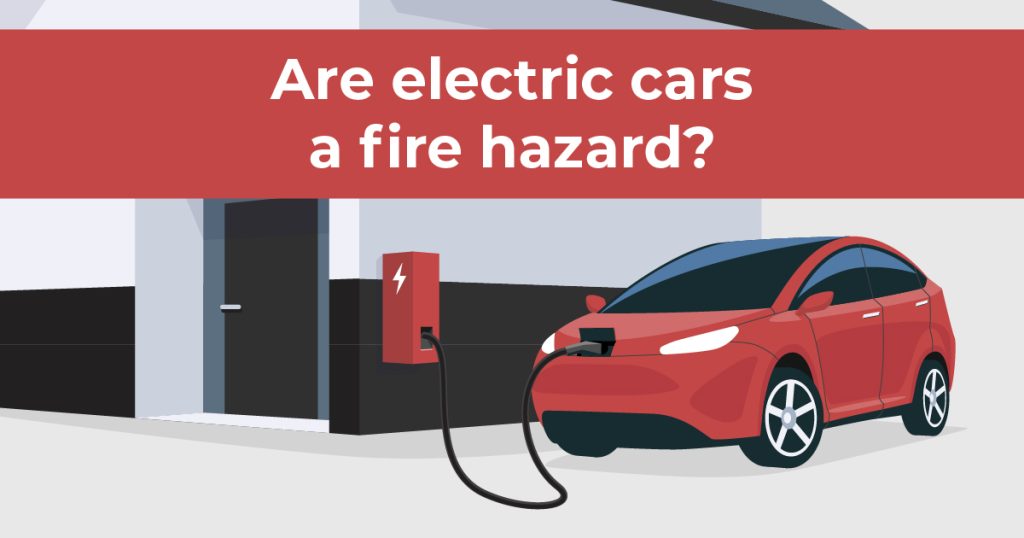Your cart is currently empty!
Are Electric Cars a Fire Hazard?
Electric cars are all the rage at the moment.
In fact, as of January 2024, the UK has reached the milestone of having more than one million electric vehicles on its roads for the first time.
The industry has come a long way in the last few years, and this growth is in part due to a growing environmental concern among consumers and in part because of the government’s upcoming ban on the sale of new petrol and diesel vehicles which is set to come into force in 2035.

However, while a good thing for the environment, electric cars are not without their problems.
A lack of infrastructure and high upfront costs are two of the biggest difficulties associated with electric cars, but there is also a growing perception that they are a fire hazard.
In this article, we’ll take a look at whether electric cars are a bigger fire risk when compared with fuel alternatives, and how to put electric car fires out should one occur.
How are electric cars powered?
Perhaps the biggest reason why electric cars are considered to be a fire risk is because they are powered by lithium-ion batteries.
These batteries send energy to an electric motor which generates power that causes the car to move. As electric motors generate more torque (force) than a fuel vehicle, power is sent directly to the car’s wheels which results in instant and faster acceleration.
While they are great at powering electric vehicles, if they become damaged lithium-ion batteries can cause severe fires, so they must be stored correctly within the vehicle. Otherwise, you will likely be confronted with an extreme type of fire that can be difficult to extinguish.
Lithium-ion battery fires are typically caused by charging the battery incorrectly, damage to the battery or when the battery itself is substandard.
Are electric cars a bigger fire risk than petrol/diesel?
As mentioned earlier, there is a common perception that electric cars are a bigger fire risk than petrol or diesel vehicles.
However, there is little evidence to support this.
According to Honeywell Safety and Productivity Solutions, there were just 239 fires in the UK between 2022 and 2023 as a result of electric vehicles, and the Swedish Civil Contingencies Agency revealed that fuel vehicles are 19 times more likely to catch fire than electric cars.
Despite this, electric car vehicle fires are often more widely reported. This could be for several reasons, including:
- the fact that the technology is still in its infancy and therefore more newsworthy
- larger and more severe blazes can be produced by lithium-ion batteries
- misinformation still surrounds these events and the technology
For example, the fire that broke out at Luton Airport car park in 2023 and destroyed more than 1,400 vehicles was caused by a diesel car, but many people wrongly believe it to have been the result of an electric car fire.
While an electric car fire is likely to be more dangerous than a petrol or diesel one, the scientific consensus suggests that there is no evidence that the fire risk itself is any greater.
How do you put out an electric car fire?
If you drive an electric car and a fire occurs, you should not attempt to put it out yourself unless the following three factors are all at play:
- you know you have the right extinguisher type
- If the fire is still small enough to be tackled via an extinguisher
- If the fire is blocking your escape route
While your natural response may be to try and save your vehicle, you should always follow the fire service’s advice of ‘Get Out, Stay Out and Call 999’. Thermal runaway is a process which accelerates a fire’s growth in a matter of seconds, making it unsafe to tackle, so we never advise using a lithium fire extinguisher for large fires.
Due to the severity of these types of fires, specialist techniques that only the fire brigade can carry out are required. They will often use a combination of methods including fire suppression blankets and specialised lithium fire extinguishers.
Here at Fire Safety Equipment, we provide organisations with a wide range of fire extinguishers including lithium extinguishers that are required by organisations that produce, store or transport goods that contain lithium and lithium-ion batteries. Order your car fire extinguishers online today and get next-day delivery to ensure you have the equipment you need, whether it’s for your personal car or a whole company fleet.

